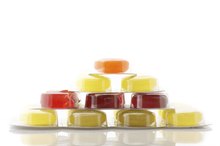What does fact checked mean?
At Healthfully, we strive to deliver objective content that is accurate and up-to-date. Our team periodically reviews articles in order to ensure content quality. The sources cited below consist of evidence from peer-reviewed journals, prominent medical organizations, academic associations, and government data.
- Office of Dietary Supplements of the National Institutes of Health: Zinc
- Linus Pauling Institute at Oregon State University: Zinc; Jane Higdon et al.; February 2008
- "American Journal of Clinical Nutrition"; Zinc Toxicity; G.J. Fosmire; February 1990
- "American Journal of Clinical Nutrition"; Zinc Toxicity; G.J. Fosmire; February 1990
- Linus Pauling Institute at Oregon State University: Copper; Jane Higdon et al.; July 2007
The information contained on this site is for informational purposes only, and should not be used as a substitute for the advice of a professional health care provider. Please check with the appropriate physician regarding health questions and concerns. Although we strive to deliver accurate and up-to-date information, no guarantee to that effect is made.
Can You Get Dizzy After Taking Zinc?
Zinc is a trace mineral needed by the human body in tiny amounts in order to maintain good health. In addition to preventing zinc deficiency, many people take zinc supplements for a variety of reasons, including boosting the immune system and preventing heart disease. Although zinc is generally safe and well-tolerated, large doses of zinc may cause a variety of side effects, including dizziness.
Dizziness
Ingesting large doses of zinc can lead to a condition known zinc toxicity. Symptoms of acute zinc toxicity can begin as rapidly as 30 minutes after consuming a high dose of zinc. Frequent symptoms of zinc toxicity include dizziness, headache and drowsiness, explains the University of Maryland Medical Center.
Dose
Side Effects of Too Much or Not Enough Zinc
Learn More
The maximum amount of zinc you should take in one day is 40 mg, according to the Office of Dietary Supplements of the National Institutes of Health 1. Ingesting more than 40 mg per day increases of risk of zinc toxicity and symptoms such as dizziness. Do not take more than 40 mg of zinc per day unless specifically instructed to do so by a qualified health practitioner.
- The maximum amount of zinc you should take in one day is 40 mg, according to the Office of Dietary Supplements of the National Institutes of Health 1.
- Do not take more than 40 mg of zinc per day unless specifically instructed to do so by a qualified health practitioner.
Mechanism
The exact reason why excess zinc intake causes dizziness is not well understood, especially for cases of acute zinc toxicity caused by ingestion of one large dose of zinc. Chronic zinc toxicity, caused by long-term exposure to high levels of zinc, is known to lead to a deficiency in copper, which in turn can cause anemia, explains an article published in the February 1990 issue of the "American Journal of Clinical Nutrition." One common symptom of anemia is dizziness 3.
Additional Symptoms
Side Effects of Zinc Lozenges
Learn More
Chronic zinc toxicity has been reported to result in a weakened immune system, as well as potentially harmful alterations in the ratio of HDL, or "good cholesterol" to LDL, or "bad cholesterol."
Related Articles
References
- Office of Dietary Supplements of the National Institutes of Health: Zinc
- Linus Pauling Institute at Oregon State University: Zinc; Jane Higdon et al.; February 2008
- "American Journal of Clinical Nutrition"; Zinc Toxicity; G.J. Fosmire; February 1990
- Linus Pauling Institute at Oregon State University: Copper; Jane Higdon et al.; July 2007
- Mayo Clinic Laboratories, Test ID ZNS, Zinc, Serum
- Nakamura H, Sekiguchi A, Ogawa Y, Kawamura T, Akai R, Iwawaki T et al. Zinc deficiency exacerbates pressure ulcers by increasing oxidative stress and ATP in the skin.J Dermatol Sci. 2019 Jul 12. pii: S0923-1811(19)30197-5. doi: 10.1016/j.jdermsci.2019.07.004. [Epub ahead of print]
- National Institutes of Health, Office of Dietary Supplements, Zinc, Fact Sheet for Health Professionals
Writer Bio
Matthew Busse has pursued professional health and science writing since 2007, writing for national publications including "Science Magazine," "New Scientist" and "The Scientist." Busse holds a doctorate in molecular biology from the University of California-San Diego.









